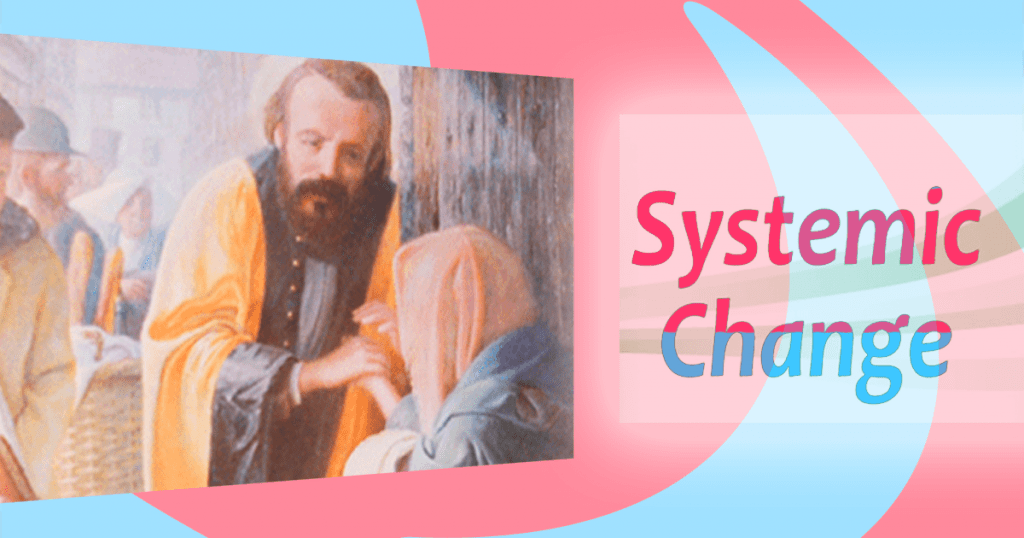 “What is your Church doing now for those who are poor?” Frederic Ozanam and the Society of St. Vincent de Paul have been answering that question for almost 200 years.
“What is your Church doing now for those who are poor?” Frederic Ozanam and the Society of St. Vincent de Paul have been answering that question for almost 200 years.
A question for everyone … especially today!
Mark Gordon, in an article found on Aleteia, writes forcefully about how the Vincent dePaul Society of today is still answering the question that stopped Bl. Frederic and his fellow collegians in their tracks. He tells the story of how the question from an atheist led to the founding of the Vincent de Paul Society and its current emphasis on doing more. More than just handout but handups! Helping people break out of the cycle of poverty.
He writes…
Recall the cohort of young republican radicals who manned the barricades of Paris in the movie “Les Miserables”? Those thrilling final scenes of the film, based on the Victor Hugo novel, depict the real events of what is known as the “June Rebellion” of 1832, when all of Paris was caught up in a maelstrom of revolutionary and counter-revolutionary violence. It was out of that maelstrom that the Society of St. Vincent de Paul was born.
In 1832, Frederic Ozanam was a 19-year-old student at the Sorbonne. He belonged to a faction aimed at restoring the primacy of the Catholic Church, which had suffered widespread disaffection in the decades preceding and following the French Revolution. In the June Rebellion, 93 republicans were killed and 291 wounded, many of them students at the Sorbonne. During the following academic year, Ozanam and his friends were challenged by some of their radical colleagues to prove that the Church cared for the poor as much as they did. “What is your Church doing now?,” the radicals demanded. “What is she doing for the poor of Paris? Show us your works and we will believe you!”
Go to the poor, those on the peripheries.
Ozanam and his companions privately conceded that their radical opponents had a point. During the decades leading up to and then after the Revolution, the Church had indeed abandoned its identification with and service to the poor. Frederic and his friends resolved to change that, if only to restore legitimacy to their claims about the Church.
Guided by Sister Rosalie, Frederic and his friends personally took the love of Christ into the ghettos of Paris. “Let us go to the poor,” became their rallying cry. [He and Pope Francis sing from the same hymnal]. They provided food, housing and clothing. They took up legal defenses for the indigent and obtained medical assistance for the sick.
They also studied the conditions of the poor – how they had gotten that way and what could be done to ameliorate their conditions – and began to advocate on their behalf…
Rediscovering “systemic change”
Historically, much of the Society’s emphasis has been on ameliorating immediate conditions like a lack of food and clothing, or else providing rental, utility, and other cash assistance. But in recent years, the Society has begun focusing more and more on “systemic change,” a broad-based approach to ending poverty; if not for all, or even for most, then at least for a few who are ready to take the journey up from destitution.
The idea is for the Society to provide deep resources that address elements in the “circle of poverty,” things like job training, education, basic health and dental care, transportation, housing, and so on. At the same time, needy individuals who desire to understand and overcome the roots of their personal situation are being identified and mentored through a process designed to equip them with the skills they need to build independent and sustainable lives. Finally, through its Voice of the Poor initiative, the Society is taking an active part in political debates over issues like food assistance, the minimum wage and income inequality, with the aim of preserving the social safety net and correcting those injustices that lead to poverty.
All of this is perfectly aligned with Blessed Frederic’s thinking. He wrote, “You must not be content with tiding the poor over the poverty crisis: You must study their condition and the injustices which brought about such poverty, with the aim of long-term improvement.”
A Bridge between the left and the right
That improvement is what Vincentians call “systemic change,” and it takes place on the personal, community, and national level. In this way, the Society’s notion of systemic change can be seen as a bridge between the approaches proffered by the political left – which professes compassion but prefers to keep people as perpetual wards of the state – and the political right, which would like to shame or starve the poor out of their condition.
In his landmark encyclical, Rerum Novarum, the father of modern Catholic Social Teaching, Pope Leo XIII, wrote that the Church’s “desire is that the poor should rise above poverty and wretchedness, and should better their condition in life; and for this it strives.” He wrote those words in the same document in which he called for vast changes in the economic and social systems of the emerging industrial world. The Society of St. Vincent de Paul’s work on systemic change is of a piece with Leo’s: Provide the economic, social and personal means for the needy to walk out of poverty on their own.
Pope Francis walks in this tradition! And he is calling us all to do.
Go to the peripheries!







0 Comments